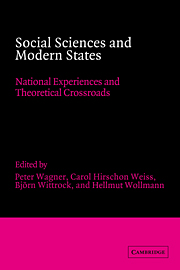Book contents
- Frontmatter
- Contents
- Acknowledgements
- Notes on contributors
- Part I National experiences in comparative perspective
- Part II Policy sciences at the crossroads
- 12 Frame-reflective policy discourse
- 13 Research programmes and action programmes, or can policy research learn from the philosophy of science?
- 14 Policy research: data, ideas, or arguments?
- 15 Social knowledge and public policy: eight models of interaction
- Part III Epilogue
- Index
15 - Social knowledge and public policy: eight models of interaction
Published online by Cambridge University Press: 05 February 2012
- Frontmatter
- Contents
- Acknowledgements
- Notes on contributors
- Part I National experiences in comparative perspective
- Part II Policy sciences at the crossroads
- 12 Frame-reflective policy discourse
- 13 Research programmes and action programmes, or can policy research learn from the philosophy of science?
- 14 Policy research: data, ideas, or arguments?
- 15 Social knowledge and public policy: eight models of interaction
- Part III Epilogue
- Index
Summary
The coming of modernity in the emerging industrial civilizations and nation-states of the nineteenth century entailed new forms of understanding of societal reality (see Wittrock et al., chapter 2 in this volume). Some older forms of such understanding were being transformed and renewed in the so-called marginalist revolution in political economy and in the ensuing neoclassical synthesis. Other forms of discourse – such as major parts of the moral sciences, idealistic philosophy, and, most clearly perhaps, the preindustrial forms of study of public finance and public policies, the so-called cameral and policy sciences – were either being transformed beyond recognition or quietly superseded.
The confluence of different projects to come to terms with the social question of industrial society and with the question of reconstituting cultural and national identity in such a society came together within the overall framework of the modern nation-state. Knowledge related to these various projects was linked in more or less direct ways to the development of this modern state. In many countries – and as shown in detail in this volume in the cases of, for example, the United Kingdom and The Netherlands – the agendas of both policy discourse and policy making were fundamentally shaped by such interlocking networks of power and knowledge, or – to use our own terminology – discourse coalitions (see Smith (chapter 5) and by Blume et al. (chapter 7) in this volume).
- Type
- Chapter
- Information
- Social Sciences and Modern StatesNational Experiences and Theoretical Crossroads, pp. 333 - 354Publisher: Cambridge University PressPrint publication year: 1991
- 18
- Cited by



